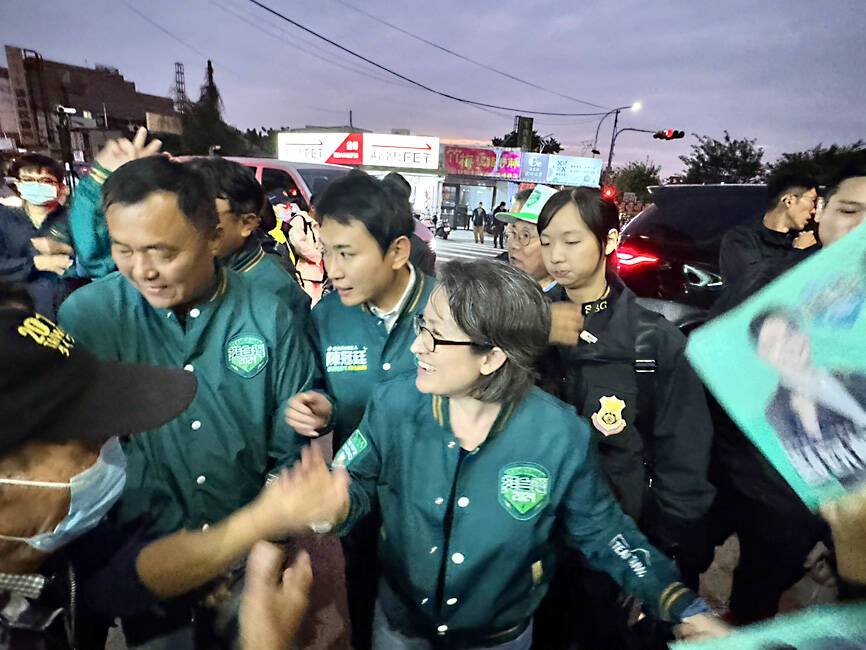Democratic Progressive Party (DPP) vice presidential candidate Hsiao Bi-khim (蕭美琴) on Tuesday questioned the relevance of the so-called “1992 consensus,” a key element of the Chinese Nationalist Party’s (KMT) China policy, which she called outdated.
“The KMT insists on adhering to the ‘1992 consensus,’ a stance they have maintained for more than 30 years. However, our society is focused on moving forward, isn’t it?” Hsiao told a rally in Yunlin County.
The “1992 consensus,” a term former Mainland Affairs Council chairman Su Chi (蘇起) in 2006 admitted making up in 2000, refers to a tacit understanding between the KMT and the Chinese Communist Party that both sides of the Taiwan Strait acknowledge that there is “one China,” with each side having its own interpretation of what “China” means.

Photo: Tsai Tsung-Hsun, Taipei Times
The DPP has never acknowledged the “1992 consensus,” saying that Beijing does not recognize the Republic of China and acceptance of the understanding would imply agreement with China’s claim over Taiwan.
China considers recognition of the “1992 consensus” a prerequisite for dialogue between the two sides and has cut off all communications with Taipei since the DPP came to power in 2016.
“How can we rely on proposals from three decades ago to navigate the modern world?” Hsiao, the former representative to the US, said in Hoklo (commonly known as Taiwanese).
In 1992, China was just beginning its journey toward reform and opening up, when then-Chinese leader Deng Xiaoping (鄧小平) advocated for a low-key approach and emphasized economic development, she said.
That prompted numerous Taiwanese businesses to invest and do business in China, she said.
“However, the China we see today is different from that of 1992. China has been suppressing human rights, affecting many Taiwanese businesses there,” she said.
During the presidency of former president Ma Ying-jeou (馬英九), many Taiwanese businesses invested heavily in China after the signing of the Economic Cooperation Framework Agreement with Beijing in 2010, Hsiao said.
“Now we are in a situation where we’ve placed numerous eggs in one basket, and unfortunately, that basket has encountered some issues,” the former diplomat said.
For example, the unemployment rate among young Chinese has passed 20 percent, with some academics suggesting it might even reach as high as 40 percent, she said.
To mitigate the risks of overreliance on China, Taiwan has affirmed its commitment to “connect with the world,” becoming the first country with which US President Joe Biden signed a trade agreement after assuming office in 2021, she said, referring to the US-Taiwan Initiative on 21st-Century Trade.
The first agreement under the initiative, launched in June last year, was signed by both sides in June.
The current trade volume between Taiwan and the US is more than double what it was when President Tsai Ing-wen (蔡英文) was elected in 2016.
Hsiao, 52, last month resigned as representative to the US, where she had served for more than three years, to join the presidential ticket of Vice President William Lai (賴清德).

The manufacture of the remaining 28 M1A2T Abrams tanks Taiwan purchased from the US has recently been completed, and they are expected to be delivered within the next one to two months, a source said yesterday. The Ministry of National Defense is arranging cargo ships to transport the tanks to Taiwan as soon as possible, said the source, who is familiar with the matter. The estimated arrival time ranges from late this month to early next month, the source said. The 28 Abrams tanks make up the third and final batch of a total of 108 tanks, valued at about NT$40.5 billion

Two Taiwanese prosecutors were questioned by Chinese security personnel at their hotel during a trip to China’s Henan Province this month, the Mainland Affairs Council (MAC) said yesterday. The officers had personal information on the prosecutors, including “when they were assigned to their posts, their work locations and job titles,” MAC Deputy Minister and spokesman Liang Wen-chieh (梁文傑) said. On top of asking about their agencies and positions, the officers also questioned the prosecutors about the Cross-Strait Joint Crime-Fighting and Judicial Mutual Assistance Agreement, a pact that serves as the framework for Taiwan-China cooperation on combating crime and providing judicial assistance, Liang

A group from the Taiwanese Designers in Australia association yesterday represented Taiwan at the Midsumma Pride March in Melbourne. The march, held in the St. Kilda suburb, is the city’s largest LGBTQIA+ parade and the flagship event of the annual Midsumma Festival. It attracted more than 45,000 spectators who supported the 400 groups and 10,000 marchers that participated this year, the association said. Taiwanese Designers said they organized a team to march for Taiwan this year, joining politicians, government agencies, professionals and community organizations in showing support for LGBTQIA+ people and diverse communities. As the first country in Asia to legalize same-sex

MOTIVES QUESTIONED The PLA considers Xi’s policies toward Taiwan to be driven by personal considerations rather than military assessment, the Epoch Times reports Chinese President Xi Jinping’s (習近平) latest purge of the Chinese People’s Liberation Army (PLA) leadership might have been prompted by the military’s opposition to plans of invading Taiwan, the Epoch Times said. The Chinese military opposes waging war against Taiwan by a large consensus, putting it at odds with Xi’s vision, the Falun Gong-affiliated daily said in a report on Thursday, citing anonymous sources with insight into the PLA’s inner workings. The opposition is not the opinion of a few generals, but a widely shared view among the PLA cadre, the Epoch Times cited them as saying. “Chinese forces know full well that